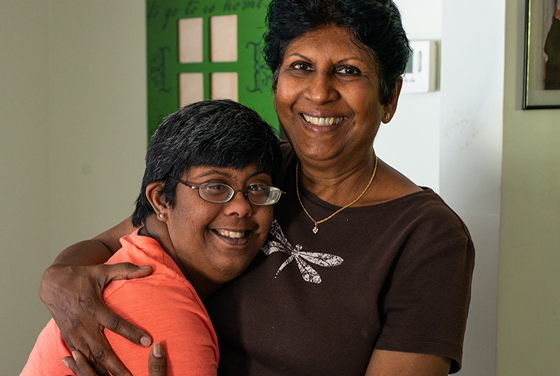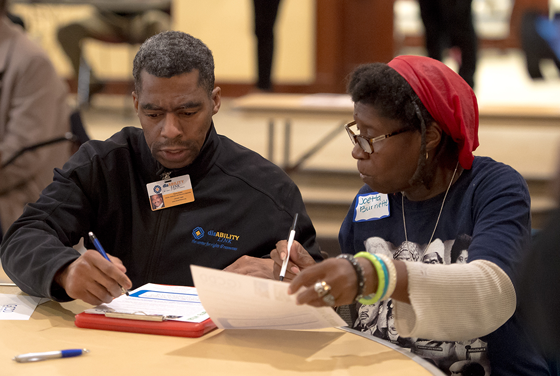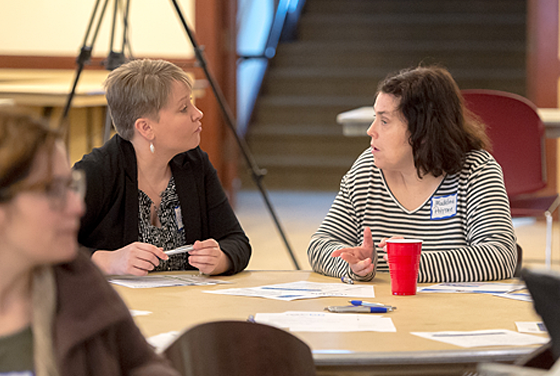Supported Decision-Making
The Partnership: The Supported Decision-Making (SDM) Project promoted by the Georgia Advocacy Office (GAO) seeks to lay the foundation for widespread adoption of Supported Decision-Making as an alternative to Guardianship in Georgia. For generations people with intellectual and developmental disabilities have been over-protected, over-controlled, isolated, segregated and excluded from communities, and often forced to live in places removed from the lives and experiences that people without disabilities take for granted. This kind of segregation has led to a constrained life with loss of power, autonomy and “inalienable rights.” The inherent design of controlled environments often causes people to become further disenfranchised from the community, leading to a lack of opportunities to build relationships and make choices. People are classified and categorized rather than supported as individual contributing members of our society.
Guardianship’s prominence within society as a primary vehicle to “protect” people with disabilities from making the “wrong” decisions about their lives and resources further compromises accessibility to basic rights. These historical and current processes permeate society and result in people experiencing disabilities being treated as if they are “less than” and incapable of managing their own lives including the most basic of life’s choices. People under guardianship experience a kind of “civil death” because they have no right to make their own decisions about their health care, their finances, their relationships, and other day-to-day decisions. People under guardianship often are less likely to live in their own homes or apartments, less likely to have jobs in the community, and less likely to have friends. The Supported Decision-Making (SDM) Project seeks to promote SDM in Georgia in order to give people with disabilities a voice, to increase their ability to exercise rights and to reduce reliance upon guardianship.
The project’s launch was a state-wide symposium in November of 2018, that brought together a wide range of stakeholders interested in learning more about SDM. This forum’s goal was to increase awareness about SDM. Participants from CPR’s existing pilot program will share their successful experiences and best practices in SDM. Next, GAO’s Citizen Advocacy program will build upon existing relationships and encourage growing circles of trust for stronger support for personal decision making.
Citizen Advocacy is built on one-to-one, freely given personal relationships between two people. One is a person with a developmental disability who has often been excluded from typical community life, and the other is a person who is living a good life in the community. Citizen advocacy coordinators and board members work under a guiding set of principles to make the strongest possible match between people. Key aspects of these principles include: loyalty to the person with a disability, the relationship is freely given, commitment to a long-lasting relationship, and contribution to the larger community. Fidelity to these key principles has resulted in almost 600 relationships with many lasting over 20 or even 30 years. The strength and longevity of these relationships will serve as a strong foundation for the work of this grant. The trust in these relationships will lead to more sustainable long-term support for decision making.
The project will offer training in SDM for people with intellectual and developmental disabilities and their citizen advocates who wish to be part of the project. Deep listening, personal presence, and getting to know the person through unpaid relationships with people who know the person well, can best represent a person’s right to have autonomy over one’s life. 4-5 individuals under or at risk for guardianship with execute SDM agreements and, with their supporters, will begin making their own decisions. GAO will engage and inform people with and without developmental disabilities about the process of SDM during this project. GAO will also analyze current Georgia law to advance Supported Decision-Making as part of the umbrella of supports available to people with disabilities instead of relying on guardianships.
Finally, GAO will provide a report that includes recommendations for immediate change to advance SDM and eliminates restrictive practices (e.g. unnecessary guardianship).
 Nandi Isaac
Nandi Isaac GCDD Advocacy Days
GCDD Advocacy Days GCDD Advocacy Days
GCDD Advocacy DaysOur Partner: As the designated, independent Protection and Advocacy System (P&A) for people with disabilities in Georgia, Georgia Advocacy Office’s (GAO) work includes the facilitation of access to appropriate services and supports so that people with disabilities can leave segregated settings and live successfully in the community. They work to restore rights so that people can live freely and independently without guardianship, and ensure that they have the support needed to make decisions about their lives. GAO is committed to ensuring that people with disabilities retain autonomy and control over their lives and services by using supporting decision-making as well as an alternative to guardianship.
GAO promotes Supported Decision-Making as an alternative to guardianship’s barriers to independence disallowing individuals to make key life decisions including: where people live and work, their friends, their medical care and their finances. As the P&A, GAO provides vigorous advocacy and legal representation to people with disabilities under guardianship and conservatorship in order to restore their rights and regain the freedom and independence in their lives that was taken away from them due to presumed incompetence.
GAO uses their “range of remedies” (e.g., advocacy assistance in negotiation or mediation; outreach; legislative monitoring; legal assistance) available to support people with disabilities to overcome barriers to independence including guardianship. Statewide training on SDM is provided for key stakeholders as an alternative to guardianship. The project also identifies people who will elect to begin the process of SDM within the context of Citizen Advocacy relationships. GAO envisions a Georgia where people are given the dignity to have autonomy over their lives. The training implemented through the project emphasizes deep and intuitive listening and relationship building as a foundation in Georgia where SDM takes precedence over restrictive alternatives.

